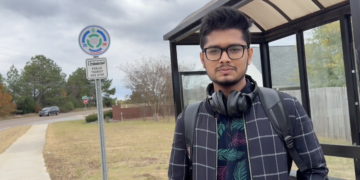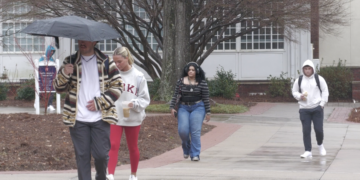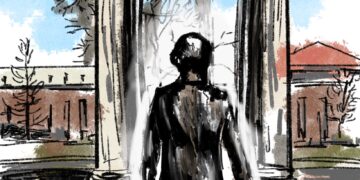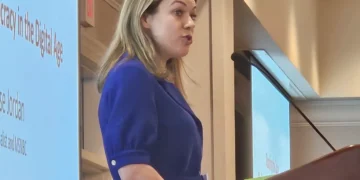
Three consecutive years of record-breaking freshman classes has caused the University of Mississippi to expand housing options and has created uncertainty for students as they sit on housing waitlists and struggle to find off-campus accommodations.
When Assistant Vice Chancellor and Director of Student Housing John Yaun joined the university in 2019, there was a strategic plan for student housing.
“Because of all the changes, much of that strategic plan is almost obsolete or not applicable,” Yaun said earlier this month. “At that time, the freshman class that we were housing was about 3,200, and right now I think we have at least 6,000 first-year students that are signed up for housing.”
UM has 22 student housing locations on and off-campus, with a total of 6,841 bed spaces. On-campus residence halls and Campus Walk have 5,687 bed spaces. The other 1,154 bedspaces are distributed across five off-campus apartment complexes that have entered master lease agreements with the university.
All bed spaces are currently filled, and many freshmen and upperclassmen spent the summer on university housing waitlists.
At the beginning of July, the freshman waitlist consisted of approximately 140 women and 70-80 men, Yaun said. Freshmen are required by the university to live in student housing. The waitlist consisted of 30 women and 10 men on Aug. 9 and was down to one woman and two men on Aug. 21. The waitlist for sophomore and upperclassmen was at 120 on Aug. 9.
As the university receives cancellations, students are contacted and placed in open spots according to the order in which they joined the waitlist. While the university plans to house all freshmen, Yaun said it is not likely that the university would be able to find spots for all the upperclassmen on the waitlist.
“Just in case we didn’t get cancellations, we communicated to (freshmen) that we may not have a bed for you (and) you’ve got some options. You can either stay on the waitlist or you (can pursue) an exemption to be released from the requirement to live on campus,” Yaun said. “Some have done that. Some have decided to stay on the waitlist, but we’ve given them the option and let them know we may not have a bed available.”
As of Aug. 9, approximately 180 freshmen had opted for an exemption from university housing, Yaun said.
Remaining on the waitlist for a long period of time has caused stress for many incoming students. Freshman biological science major Jonlya Garrett spent several weeks on the waitlist before securing a spot in July.
“For weeks and weeks, I was on the waiting list stressing if I was going to get one. I was stressing so badly because, with my scholarships, I have to stay in Ole Miss-owned housing,” Garrett, a Grove Scholar, said. “If I had not gotten a room, I don’t know how I would have been able to live.”
Garrett said that she did not expect to encounter this difficulty.
“When coming to this school, I didn’t know it would be this stressful trying to find a dorm room. I have friends and family that have gone here that have not had any problems with housing and getting a dorm,” Garrett said.
For upperclassmen, the housing department encouraged students to start the search for non-student housing early, Yaun said.
“We’ve been communicating with (upperclassmen) every month that there’s nothing available and that they need to think about an option off campus to live,” Yaun said. “I know that off-campus housing has become more expensive, and that’s an issue.”
Destiny Kirksey, a junior biology major, decided not to join the upperclassmen waitlist.
“By the time upperclassmen had their housing portal windows open, there was nowhere else to stay,” Kirksey said. “Frankly, I didn’t think there was any point in me getting on the waitlist when I could just find another place to stay.”
However, her search for an apartment was not easy.
“Most of the apartments were booked and taken. It took me three months to find an apartment that fit my budget. Even then, it wasn’t furnished, and I still have to pay for furniture,” Kirksey said. “It took me a while. I’m still finalizing some things, but at least I have a place to live in the fall.”
Anna Buckley, a junior public health and health sciences major who is leasing a house, described the experience of searching for non-student housing as stressful.
“I had a lot of different emotions, but one that was constant was feeling stressed. During the spring semester, trying to balance house hunting with my class load, student organizations and other commitments proved to be very difficult,” Buckley said. “Trying to focus on the reason I’m here at school — to get my education — was put on the back burner, which should never be the case.”
While Kirksey and Buckley have secured housing, there still are upperclassmen looking for accommodations. Social sites such as Facebook have been populated with groups of students and parents searching for non-student housing in Oxford.
A group named Oxford Mississippi (U.S.) Off Campus Student Housing/Rentals/Rooms For Rent has more than 6,000 members. As of Aug. 22, four days before the start of the fall semester, students were still posting looking for housing.
While the university does not have an office dedicated to helping students find non-student housing, Yaun said that his department is starting to talk about the resources it can provide this coming year and can have one-on-one conversations with students.
“Ideally, in the future, we’d like to be able to offer enough beds for upper-class students so that we can have an affordable living option for them,” Yaun said, noting that one of the three dorms being built in the old Kincannon Hall lot are planned to go to upperclassmen.
Construction on those residence halls is projected to be completed by summer 2026.
In addition to struggles securing housing, students and parents have expressed concern about the master-leased, off-campus apartments. Billi Hart, the parent of an incoming freshman, talked about why she wanted her son to stay on campus.
“I want him to have the dorm experience,” Hart said. “If you’re not on campus your freshman year, that feels like a bit of a disadvantage to me because you’re missing out on so many of those things that are at your fingertips.”
Yaun assured students and parents with such concerns that the university has worked to make sure students housed off campus are integrated into the campus community.
“Many parents are reluctant to have their students live in a master lease off campus, and I understand because they want them to be a part of the on-campus experience, but our goal is to create the very same experience that we have on campus,” Yaun said. “We have residential assistants there, we’re going to have programming there, we’re going to have security there. Everything that someone gets in Martin or Stockard (on campus), they’re going to get at one of the properties (off campus).”
In recent years, many students have suggested that the university accept fewer students to alleviate some of the housing pressure.
“I always love an opportunity to meet more people and believe that everyone should have an opportunity (for higher education). However, at this time, the university is not equipped to handle this influx,” Buckley said. “It definitely affects my opinions of the university because it makes me feel like I’m just a number to the school as they try and succeed at increasing the amount of students here each year.”
However, the Mississippi Institutions of Higher Learning statewide open-admissions policy indicates that a cap cannot be placed on the number of in-state students admitted to UM.
According to a February 2024 interview that The Daily Mississippian conducted with UM Director of Admissions Jody Lowe, there is language in the policy that allows the university to limit the number of out-of-state students admitted.
“Every year, we take a fresh look at our out-of-state admissions standards. We have not started that process yet this year,” Jacob Batte, director of news and media relations for UM, said.
Yaun said his department is dedicated to keeping students informed about the housing process and is working on initiatives with the Associated Student Body housing committee. While many have wondered whether the requirement to live on campus will be eliminated, Yaun said that the university has not discussed that option.
Wesley Templet, chair of the ASB housing committee and a junior public policy leadership major, said that some of those initiatives include bringing back hall councils, making sure that maintenance issues are addressed and working with the city government to discuss affordable housing options.
In the meantime, he encouraged students to start thinking about their housing for the 2025-2026 academic year and reach out to ASB, the university and LOU-HOME — a local affordable housing non-profit — for support.
“These apartments start waiting lists as early as October in some places,” Templet said. “You can always reach out to LOU-HOME or the ASB Committee on Housing, and we can try to help you find places. We do have an Ole Miss off-campus housing website through apartments.com (that is a university partnership).”
Tanissa Ringo and Jordan Isbell contributed reporting.






































